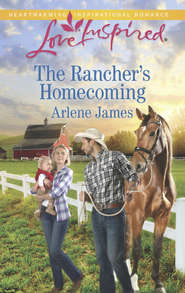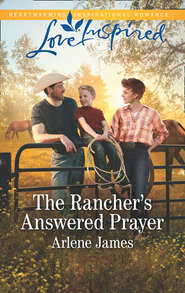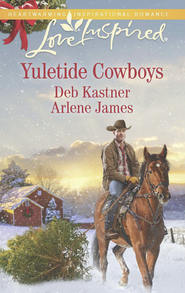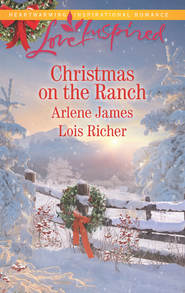По всем вопросам обращайтесь на: info@litportal.ru
(©) 2003-2025.
✖
An Old-Fashioned Love
Автор
Год написания книги
2019
Настройки чтения
Размер шрифта
Высота строк
Поля
Traci could not prevent the breakout of a smile. “That’s kind of you, but I’m still not sure—”
“I am,” he said, beaming back at her. “Please, that’s the way I want it.”
She made him no answer, merely subsided into an uncomfortable smile. So, she was going to get her ice-cream shop open after all. Thank God—and Wyatt Gilley. No doubt about it. She owed him a debt of thanks, but was she wrong to think that the man wanted more than to recompense her for the damage done by his sons? An exercise in faith, she reminded herself, and broadened her smile.
Chapter Two (#ulink_1a0c5ab7-d05b-5a9d-9544-78a95a243b5a)
“They’re really not such bad boys,” Wyatt said as they walked toward her car. “They probably didn’t realize they were doing anything wrong in the beginning, then later they were afraid to admit they’d done it. They thought the place was abandoned, you know.”
“And so it was,” Traci admitted. “My grandfather left the shop to me when he died three years ago, but I was living in Dallas then. My grandmother didn’t feel she could run the business alone, but I couldn’t bring myself to sell it, so we just closed it up and let it sit.”
“And?” he prompted.
They had reached her car, a sleek, black, luxury model she really ought to get rid of in order to spare herself the monthly payments, but she wouldn’t, except as a last resort. She opened the door and turned to face him.
“And I decided I’d be happier in Duncan running Grandpa’s ice-cream shop than running the rat race in Dallas,” she said.
He lifted a skeptical brow, blue eyes twinkling. “That’s it? You just got tired of the big city and the high-powered career, so you ditched it for an icecream shop in Duncan, Oklahoma?”
She shook her head, laughing softly. “The highpowered career’ was a rather demanding job as a legal secretary, and I never was really happy in the big city. My parents moved me there when I was in high school, but this has always been home to me. What about you, Lieutenant Colonel Gilley? What brought you here?”
He shrugged. “My boys were born here. I was stationed at Fort Sill then. We decided to live here because my wife—my ex-wife—was developing an aversion to anything military, including me.” He smiled when he said that, but Traci couldn’t help noticing the sadness that darkened his blue eyes. He seemed to sense her thoughts, for he suddenly switched his gaze to the boys, tussling together in the distance as they ran across the parking lot. “It seemed like a nice town, a good place to raise a couple of kids,” he said, “so when I retired last year, we moved back.”
She nodded, pretending to understand, when in truth, any number of questions were on the tip of her tongue. She settled on the one that seemed the most innocuous. “Aren’t you awfully young to be retired?”
He laughed then. “Not really. I went in right out of college. I retired last year with twenty years of service. That makes me forty-one, in case you’re wondering.”
“I was,” she admitted. “You seem younger.”
He grinned. “I always knew immaturity would prove worthwhile at some point in my life.”
She smiled. “I doubt that’s the reason. Perhaps your boys keep you young.”
“No way.” He shook his head emphatically. “Believe me, those two scamps have aged me dramatically in the last year or so. I guess we’re still adjusting. We didn’t spend much time together before they came to live with me. My career separated me from them for long periods, then when they were six, their mother and I divorced, so we didn’t even live together when I could be with them. Then a little over a year ago, she decided she’d done her share of the parenting, so she dropped them off with me and headed for Paris.”
“Paris, France?”
He nodded. “Marie is French. I met her when I was stationed in Europe.”
Traci didn’t know what to say. On one hand, she was appalled that a mother would seemingly abandon her young sons to a father they hardly knew. On the other hand, she didn’t want to judge the woman wrongly. She could have had very good reasons for turning her sons over to their father, and who was to say that it wasn’t for the best of everyone involved? Wyatt himself didn’t even sound particularly judgmental. True, his words had seemed condemnatory, but he had delivered them in a light, uninflected voice, almost as if she’d dropped them off on her way to the grocery store! Could he really be that casual about it? she wondered. Remembering how hotly he had defended his sons when she’d first approached him about what they’d done at the shop, she didn’t think his feelings toward his boys were at all casual. But then, she might be reading more into it than she ought to. Wyatt Gilley was nearly a total stranger to her, after all. That thought had her searching for a polite means by which to extricate herself from what had become an embarrassingly personal conversation. She took a deep breath.
“Well, I’m sure you’ll…settle into…the situation soon,” she managed before stepping behind her opened car door. “Thank you again for the way you resolved the suit. I—I’m sorry it came to that.”
He shook his head, shrugging. “My fault. I should have listened when you first tried to tell me what they’d done.”
She opened her mouth, thought better of what she was about to say, then closed it again only to smile weakly. “It’s all worked out now. That’s what counts.”
“You’re generous to say so.”
“Not really,” she refuted quickly. “I’m just happy I’ll be able to get my shop open after all. It was looking rather bleak for a while.”
“My fault again.”
“I didn’t mean it that way.”
He chuckled, a teasing gleam to his eye. “I know.”
For some reason she felt a thrill pulse through her at that. What was it about this man that did that to her? Suddenly she wasn’t certain she wanted to know. “I—I have to—to go,” she stammered, pushing out her hand. “My grandmother is expecting me.”
He clasped her hand in his own large, very hot one, and pumped her arm a few times. “I’ll see you soon, Miss Temple,” he said. “’Bye.”
“Goodbye.”
She got in the car and closed the door. It was broiling hot in there, but she was too aware of Wyatt Gilley, standing on the other side of the door, to open it again. The month of May was still new, and the weather was sparkling, perfect, but this black car seemed to absorb the bright sunshine and hold it. The price one paid for a bit of flash, she mused distractedly, digging in her purse for the keys. She found them, fitted them into the ignition and started the engine, immediately flipping on the air-conditioning before engaging the transmission and backing out of the parking space. Through it all, Wyatt Gilley just stood there smiling. He was there still when she glanced in her rearview mirror before turning out into the street. She’d be a liar if she didn’t admit how much that pleased her, but it disturbed her even more.
Wyatt Gilley was not a friend. Perhaps he was not the adversary she had previously thought him to be, but that did not make him a friend. Neither, she told herself firmly, did that make him a prospective romantic interest, not that she knew, really, what would. She labored under the conviction that when she met the right man she would just somehow know. She imagined that this knowing would bring her a great sense of peace, a kind of settling of her soul, a quiet, steady joy. She based these assumptions on the very thing everyone else did: secondhand experience. That is, the behavior, manner and countenance, as observed by herself, of the happily coupled individuals of her acquaintance, most prominently, her parents and grandparents. Nothing about Wyatt Gilley could be equated to her father or grandfather. Nothing about Gilley inspired in her even a pretension of the serenity in which her mother and grandmother so obviously dwelled, let alone inspired joy. It was quite the opposite, in fact. He disturbed her, agitated her, set her nerves on edge and her senses reeling. He was, somehow, dangerous.
And so that was that. Lieutenant Colonel Wyatt Gilley, retired, undoubtedly had certain virtues, but all in all he was just one more thing to be endured, an added bit of discomfort, a puzzle without an answer. Eventually the relationship, such as it was, would run its course and be severed, forgotten. That being the case, she could simply put him out of her mind, at least in theory. In practice, it might not be so easy. After all, she would have to explain to her grandmother what had happened in court. Also, she ought to call the reverend and let him know how everything had turned out.
Now there was a fine man. No one would have to drag him into court in order to open his eyes to the truth. In fact, the Reverend Bolton Charles was everything a woman like her could want. Tall, dark and handsome, he was also sensitive and gentle and caring, and he possessed a deep spirituality with which she could well identify. It was obvious in the way he spoke of her that he had loved his late wife very much, and that made him all the more attractive. Yet, despite her grandmother’s obvious attempts at matchmaking, Traci could not quite see herself forming a romantic attachment to Bolton Charles. How was it that she could see such an attachment forming between Wyatt Gilley and herself?
But no, that was nonsense. Wyatt Gilley was not at all the sort of man who would suit her. Not at all. And she mustn’t allow herself to think otherwise. Once more she pushed him firmly out of mind, only to find herself having to do so time and time again.
The Reverend Bolton Charles smiled at her over the rim of his tea glass. “Sounds as if everything’s finally beginning to work out.”
She nodded. “I really didn’t even expect him to show up in court, so you could’ve knocked me over with a feather when he admitted full liability.”
Bolton shrugged, the knit fabric of his polo shirt pulling taut over his shoulders. “It’s easy to misjudge someone in an emotional situation.”
“He was just so certain that his kids were telling him the truth, and to be fair, they’re gifted little actors. They almost convinced me, and I caught them at it!”
Bolton chuckled. “Sounds like quite a pair.”
Traci sighed. “Too much for me, I’m afraid. Frankly, I’m not sure having them around is such a good idea. I mean, they’re supposed to be learning a lesson, but I’m just not certain that I’m the one to be teaching it to them. I’m best with little kids, you know, infants and creepers.”
Bolton reached across the table in her grandmother’s kitchen and covered her hand lightly with his. “You’ll do fine,” he said reassuringly. “Just be firm from the outset, and be honest about what you expect of them. Don’t pretend that they can do any and everything. Kids know they have limitations, and they can smell pretense a mile away. No one can trust deceit, even if its well-meaning. Remember that you’re the adult. You’re the one in charge.”
“I know that, but will they?” she worried aloud.
“Don’t give them an option. Believe me, in the long run everyone will be happier that way. Kids aren’t comfortable when adults abdicate their control. They may resent being told what to do—that’s normal and part of developing independence—but inside they know they aren’t capable of making all the decisions. They need the security of adult supervision, whether they realize it or not.”
Traci smiled at her handsome friend thoughtfully. “You really ought to have children of your own, you know.”
A shadow passed briefly over his face. “I hope to.”
Traci could have bitten her tongue off. How could she have been so thoughtless? She had been told that after years of hoping, Bolton’s late wife had finally believed herself pregnant, only to discover that her symptoms were those of cancer. With her had died their hope of having a child of their own. She turned her hand over beneath his and squeezed his palm. “I’m sorry.”
“No, no. It was a compliment. I took it as such, anyway.”











